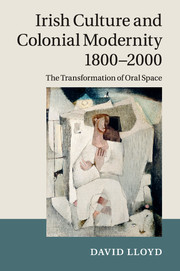Chapter 3 - Counterparts
the public house, masculinity and temperance nationalism
Published online by Cambridge University Press: 07 October 2011
Summary
I
The post-Famine Irish landscape offered a melancholy vista. The division of large parts of a once densely populated land into small farms and isolated homesteads perpetuated the silence that followed on mass death and emigration. As many have noted, the Irish rural scene that is so often taken to be traditional was in fact the product of the latter half of the nineteenth century, as both the British administration and Irish nationalists struggled over the fate of the land and the intractable differences between Irish and English relations to land and property became encoded as marks of the antagonism of Celt and Anglo-Saxon, colonized and colonizer. Even in the wake of land settlements predicated on the idea that security of tenancy would develop a capitalist sense of property and work, Irish material and cultural formations swerved away from the norms assumed in English notions of modernity and ‘improvement’. The enclosure of the Irish commons and the destruction of the clachan eventually took forms that were not anticipated by British political economists or administrators at the time of the Famine. Ireland’s economy remained predominantly agricultural, but deviated from the pattern of landlord, capitalist farmer and labouring proletariat that Charles Trevelyan and others had hoped to induce. The small family farm rather than the large capitalist enterprise emerged as the dominant form of land-holding, while grazing rather than grain production became the principal agricultural activity. In cultural terms, the most striking impact of the Great Hunger and of the post-Famine emergence of these small family holdings was the institution of primogeniture and its concomitant effects: an economically prudent emphasis on late marriage on the part of the oldest son and high rates of migration or emigration on the part of younger children. Gone was the simple subdividing of rented plots or the expansion of cultivation onto more and more marginal land; gone with them the early marriages and high rates of reproduction. The Irish population remained, in consequence both of massive emigration and of late marriage, astonishingly stable for well over a century, scarcely ever exceeding four million and eliciting gloomy speculation on the ‘vanishing Irish’. Notoriously, these new social conditions helped to produce a singularly conservative and sexually inhibiting form of Catholicism, which emphasized celibacy and modesty and the increasing segregation of the sexes into separate spheres.
- Type
- Chapter
- Information
- Irish Culture and Colonial Modernity 1800–2000The Transformation of Oral Space, pp. 85 - 115Publisher: Cambridge University PressPrint publication year: 2011



